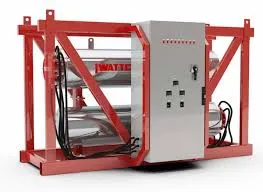industrial water boiler
The Importance of Industrial Water Boilers
Industrial water boilers play a crucial role in various sectors, including manufacturing, food processing, pharmaceuticals, and energy generation. These boilers are essential for producing steam or hot water used for heating, power generation, and other industrial processes. Understanding the functionality, types, and maintenance of industrial water boilers is vital for enhancing efficiency, safety, and sustainability within industrial operations.
Understanding Industrial Water Boilers
At its core, an industrial water boiler functions by heating water to produce steam or hot water. The steam generated can be utilized for different applications, such as driving turbines for electricity generation, providing heat for industrial processes, or even sanitizing equipment in food production. The efficiency and performance of a boiler are influenced by its design, operating conditions, and the type of fuel used.
Types of Industrial Water Boilers
1. Fire-Tube Boilers In these boilers, hot gases pass through tubes that are surrounded by water. They are known for their simplicity and efficiency, making them suitable for smaller applications where high pressure steam is not a requirement.
2. Water-Tube Boilers These are more complex and are used in large-scale applications. Water circulates through tubes that are heated by the combustion gases outside. Water-tube boilers are capable of handling higher pressures and are typically used in power plants and large manufacturing facilities.
3. Electric Boilers These utilize electricity as a source of heat and are ideal for applications where emissions regulations are stringent. They are generally more expensive to operate but can be an eco-friendly alternative.
industrial water boiler

Efficiency and Sustainability
With global initiatives targeting sustainability and reducing carbon footprints, the efficiency of industrial water boilers has gained significant attention. Upgrading to high-efficiency models or retrofitting existing boilers can lead to substantial energy savings and reduced operational costs. Modern boilers are equipped with advanced technologies such as condensing heat exchangers, which maximize energy utilization by capturing heat from flue gases.
Furthermore, the integration of automation and monitoring systems allows for real-time data collection on boiler performance. This data can be analyzed to enhance efficiency, perform predictive maintenance, and ensure compliance with environmental regulations.
Maintenance and Safety
Regular maintenance is essential for the optimal functioning of industrial water boilers. Routine inspections, cleaning, and repairs can prevent breakdowns, ensure safety, and prolong the life of the equipment. Boiler operators must be trained to identify signs of wear and tear or any operational anomalies.
Safety is paramount in the operation of industrial boilers due to the high pressures and temperatures involved. Adhering to industry standards and regulations helps mitigate risks associated with boiler failures or malfunctions. Implementing a robust safety management system not only protects workers but also ensures consistent production rates.
Conclusion
In summary, industrial water boilers are indispensable components in many industrial processes. Their ability to generate steam and hot water efficiently underpins productivity across various sectors. By investing in high-efficiency boiler systems, focusing on maintenance, and adhering to safety protocols, industries can enhance their operational effectiveness while contributing to a sustainable future. As technological advancements continue to evolve, the role of industrial water boilers will undoubtedly expand, driving innovation and efficiency in the industrial landscape.
-
Top Electric Steam Boiler Manufacturers - High Efficiency SolutionsNewsJul.30,2025
-
Top Electric Steam Boiler Manufacturers – Efficient Industrial SolutionsNewsJul.29,2025
-
Top Electric Steam Boiler Manufacturers | Reliable Industrial SolutionsNewsJul.29,2025
-
OEM Steam Boiler Solutions for Custom Needs | High Efficiency & VersatilityNewsJul.29,2025
-
High-Efficiency Thermal Oil Boiler for Industrial Heating SolutionsNewsJul.29,2025
-
Top Electric Steam Boiler Manufacturers for Industrial EfficiencyNewsJul.28,2025

